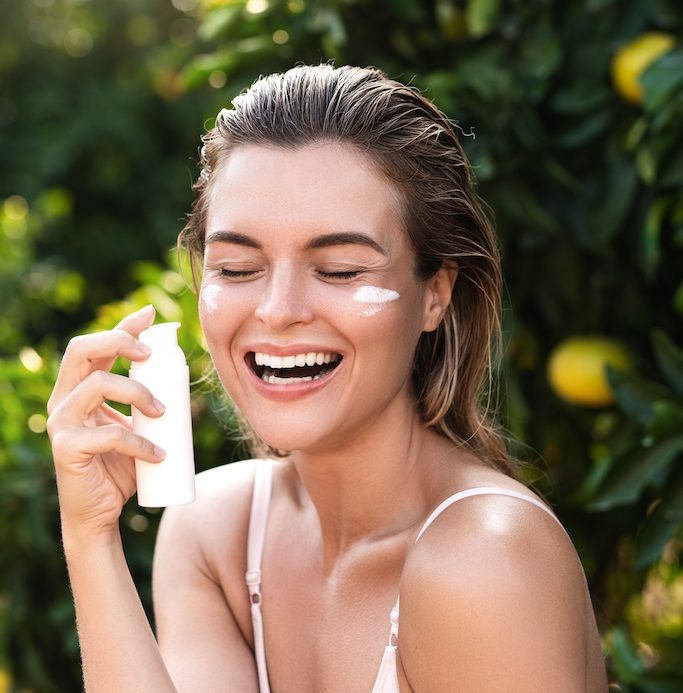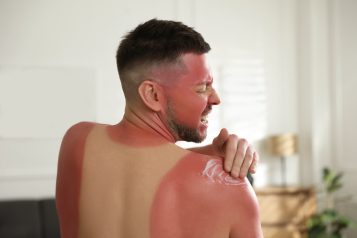Dr. Liia Ramachandra, Pharm.D., Ph.D. is a serial entrepreneur and healthcare executive. Dr. Liia is the Founder and CEO EpiLynx, Gluten-Free Skin Care and Cosmetics Brand. She comes with vast experience in Global Medical Affairs, Global Ethics and Compliance, Clinical Research, and Global Publications. Dr. Liia drove the development of the strategic vision and mission for the national field-based medical program, the development of publication plans, the planning and management of medical activities at scientific congresses, the development of program resources for Regional Medical Liaisons, and Biopharmaceutical Representatives.
 Photo Credit: Shutterstock
Photo Credit: Shutterstock
How does the sun affect acne? Good question…it doesn’t, acne-prone or not. What can happen is that when it is sunny outside, you sweat more, which causes your pores to become more clogged, resulting in an acne flare-up. Here Haute Beauty expert Dr. Liia Ramachandra tells all about how to combat the “sun-caused” acne.
Are there certain treatments that combat sun-caused acne?
Yes, cleaning your face and using less makeup that can clog your pores even more may help. Cleansing your face with an oil-free wash will help to clean the face and pores and then moisturize and nourish your face with pore refining serum and face cream for acne-prone skin. Often, the excess sebum (oils) contributes to acne-prone skin. So when using light, gentle, and oil-free face wash, you are not just gently cleansing the face but also lessening the possible acne breakouts.
Also, usually, In acne, the glands begin to produce too much sebum. The excess sebum mixes with dead skin cells, and both substances form a follicular plug. If the plugged follicle is close to the skin’s surface, it bulges outwards, creating a whitehead. Pore refining serums and face creams (usually with salicylic acids and alpha hydroxy acids) can help unclog the pores and tighten them, minimizing acne and breakouts.
What skincare mistakes do acne-prone skin individuals often make during the summer months?
Avoid anything heavy and pore-clogging (comedogenic) such as heavy waxy, oily serums and creams, heavy foundations, and powders. Heavy is something like waxes, such as beeswax, synthetic waxes, lots of heavy oils such as coconut oil, etc. Avoid ingredients such as dimethicones, silicones, etc. By heavy, I also mean the creams that contain too many ingredients (more than 25 is too many). This means that there is too much ‘fluff’ and fill that will make your cream glide better and smell better but can lead to clogging of the pores and possible breakouts (with too many fillers and fragrances). I always suggest cleansing properly, using good skincare for acne-prone skin, and either an oil-free foundation or a natural/mineral SPF with zinc oxide/titanium dioxide. We offer great and affordable solutions for pore refining serum and face cream for acne-prone skin here.
 Photo Credit: Shutterstock
Photo Credit: Shutterstock
Is using an SPF safe for acne-prone skin?
Being in the sun without sunblock and/or putting on too much makeup. I always suggest that less is more, especially during the summer months it is important to adhere to it. Excessive sweat will make acne worse. So staying as much as possible out of the sun is one way. Secondly, if you go outside without sunblock, UVA and UVB rays negatively impact your skin, leading to premature aging, redness, sunburn, and possibly cancer. All of this will impact any type of skin, including acne-prone skin.
What is the best skincare routine for acne-prone skin?
Really simple: cleansing, using oil-free and clean (hypoallergenic) skincare and a natural SPF 30 (no chemical ingredients SPF). Cleansing properly means washing your face morning and evening with a gentle, oil-free cleanser and never going to bed with any makeup on. Good skincare is usually natural, mineral skincare free from too many preservatives, fragrances, and allergens (nuts, dairy, gluten, etc). Mineral sunscreen is a natural sunscreen with zinc oxide, all other sunscreens are chemical with chemical ingredients that do enter your cells and your skin and can cause redness and breakouts. Mineral/natural sunscreen just sits on top of your skin without disturbing your cells or epidermis. For more options, visit EpiLynx.
For more information, visit Dr. Brian A. Levine's social media:

























